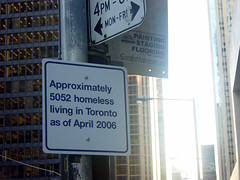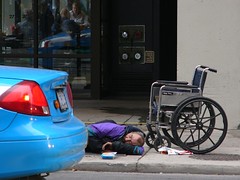
One of the fundamental human requirements is shelter. How do homeless people survive? Where do they sleep? On friends and family's couches and floors (if they are lucky), at shelters, in churches, in parks, on sidewalk grates, in abandoned buildings, in doorways, under bridges, in cars, or wherever else they can.
And of course, they sleep in tents. The burgeoning tent cities in the U.S. have finally made the national awareness. Interestingly, it seems as though the media is only interested in the newly homeless, those middle class folks who lost their homes because of the economic collapse. In other words, those who they believe are homeless because of circumstances, not because of some kind of individual moral failing. Unlike, you know, the other kind of poor.
Over the past few months, reporters from around the world have flocked to the now-famous tent city in Sacramento, Calif. When they find out that 55-year-old John Kraintz has been living in a tent for almost seven years, they turn around and walk away.
"They don't want to talk to me," he says. "They're searching for people who just lost their homes. It's kinda tough to lose a home when you've never owned one. Sorry, but most of the people here have been homeless for a long time."
Homelessness is seen as an anomaly, a sign of the economic crisis, not as a structural problem with capitalism. But there are homeless during the boom times, too, lots of them.
"The other day, I heard a German reporter ask if this is happening because of the recent economic collapse," says Kraintz. "This has been happening for 30 years, but the powers that be have been able to pretend it doesn't exist. Why aren't reporters asking about flat wages, jobs being shipped overseas and the lack of affordable housing?"
Burke agrees, saying one of the many issues ignored in most articles about tent city and homelessness is the fact that poor people cannot afford housing, especially in an expensive state like California.
"People who are poor end up homeless through no fault of their own, but because people higher up on the food chain have made affordable housing a very scarce commodity," she says. "If we had sound housing policies and programs that helped people when they have a run of bad luck, we would not have a tent city."
Kraintz says he knew the system would finally blow up. It was just a matter of time. The question, according to him, is this: Do the powers that be have the political will to create a fairer, more just economic system? <Alternet>
Photo Credit: A tent city in Fresno, from a 2004 article by Mike Rhodes on Indybay




















